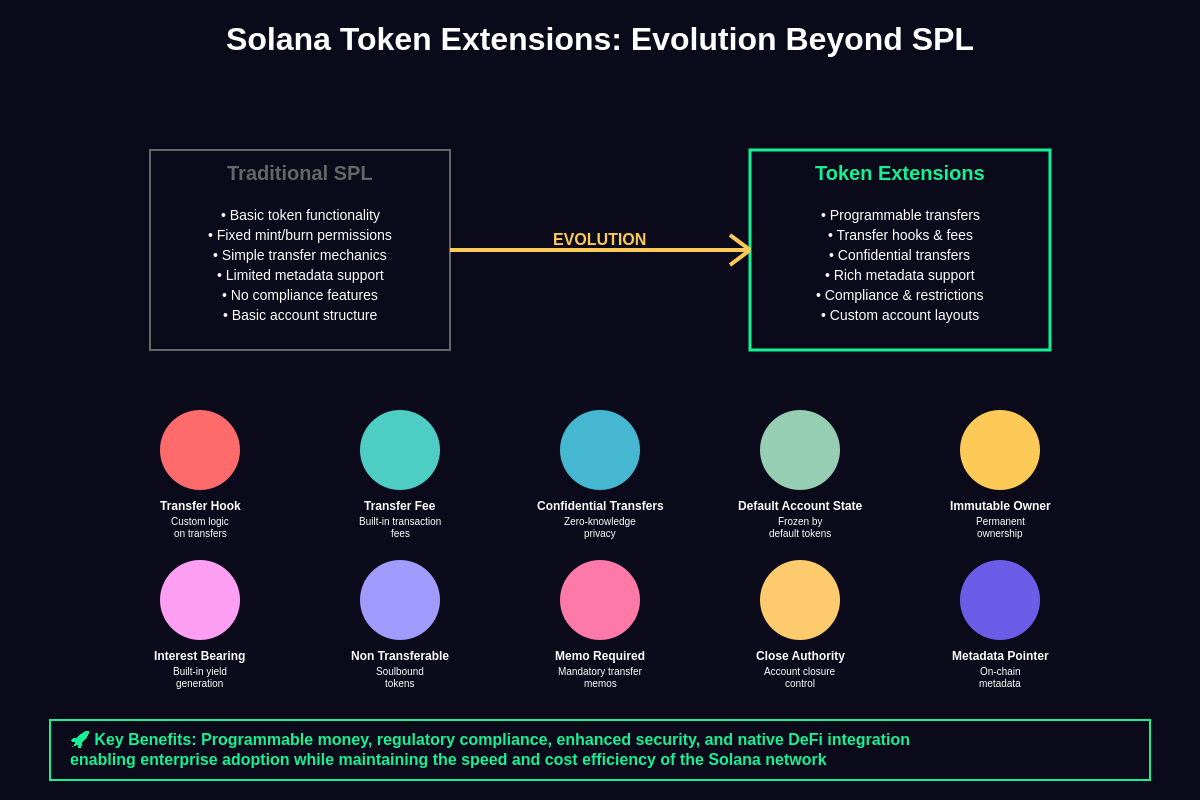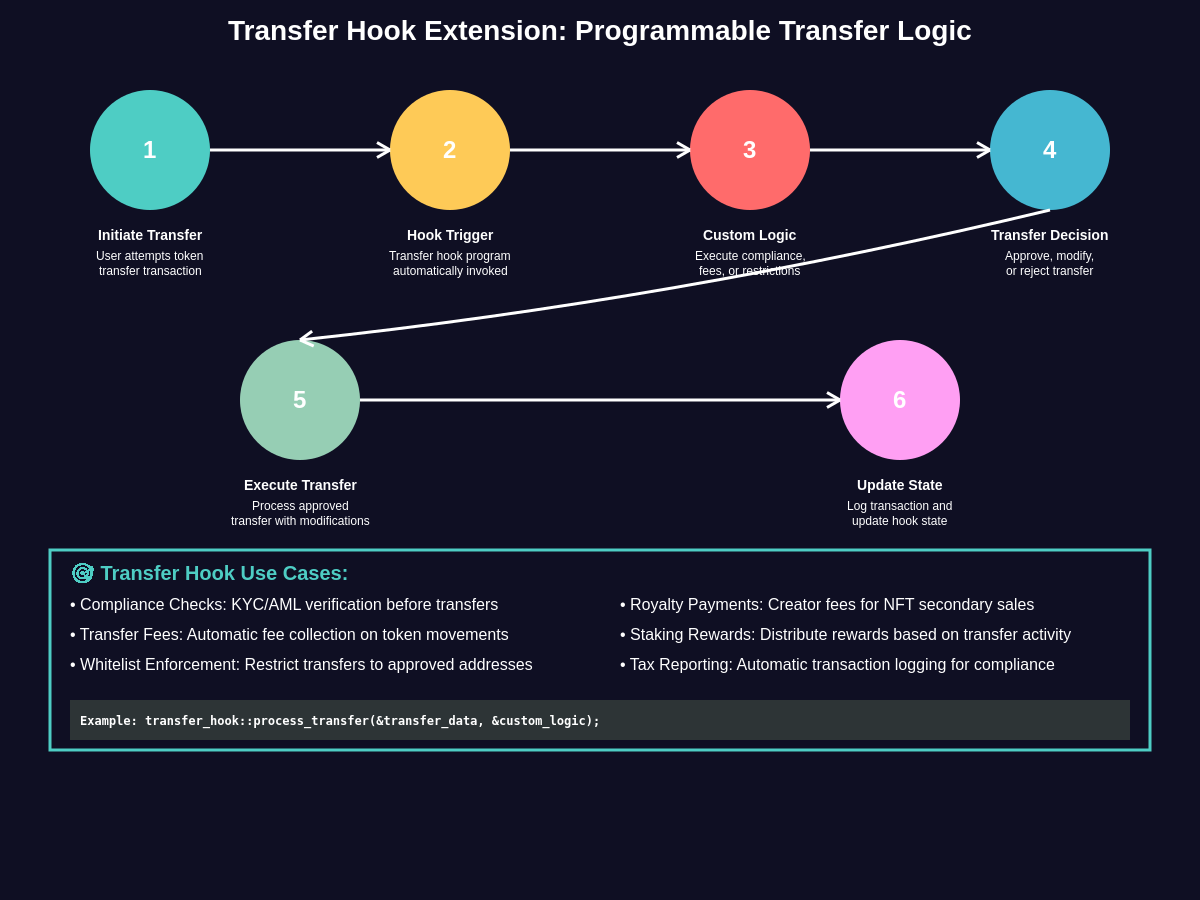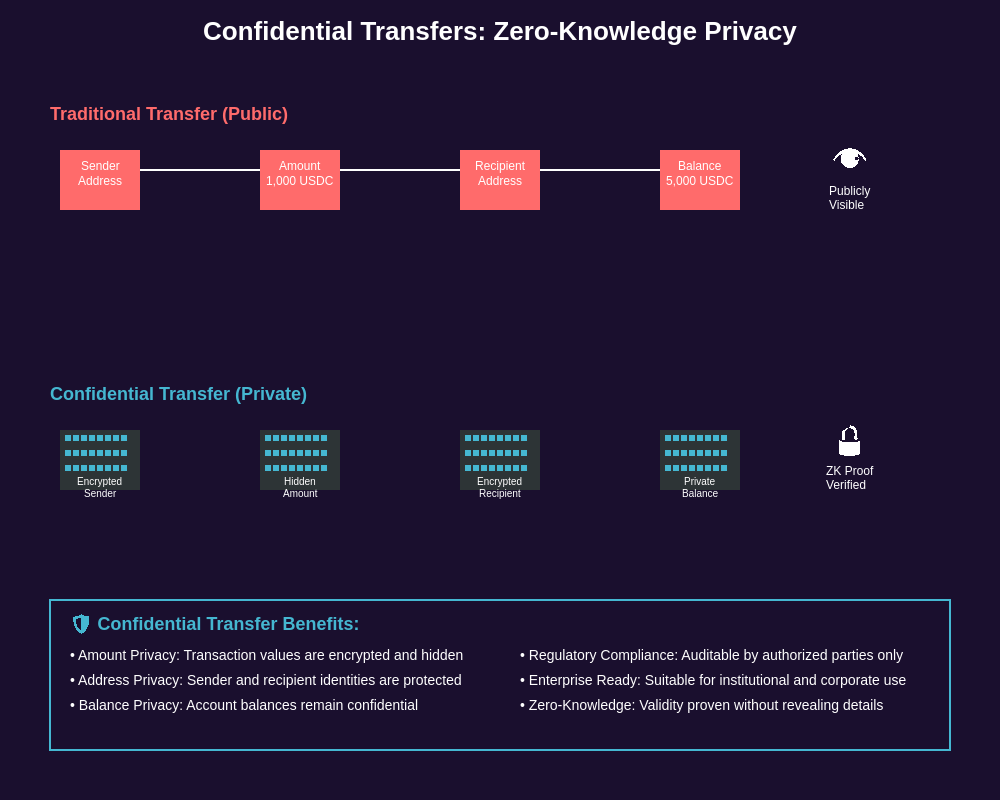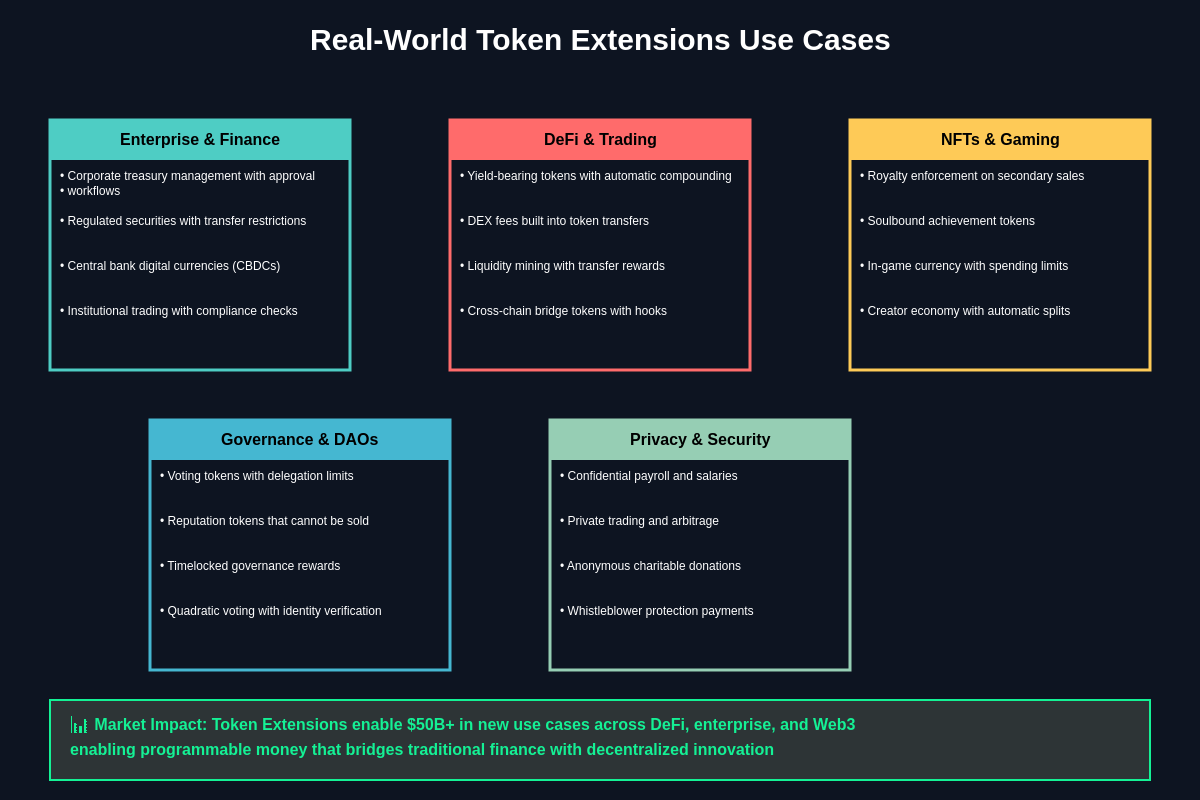For comprehensive charts and trading data on Solana’s ecosystem tokens, explore TradingView’s advanced charting tools to analyze the growing impact of Token Extensions on the market.
The Evolution of Digital Assets on Solana
Solana’s Token Extensions represent a revolutionary advancement in programmable money, extending far beyond the basic functionality of traditional SPL tokens to introduce sophisticated capabilities that bridge the gap between decentralized finance and enterprise requirements. These extensions transform simple tokens into intelligent financial instruments capable of executing complex logic, enforcing compliance requirements, and maintaining privacy while preserving the high performance and low cost characteristics that define the Solana blockchain.

The traditional SPL token standard, while groundbreaking in its simplicity and efficiency, was designed primarily for basic token operations including minting, burning, and transferring digital assets. Token Extensions build upon this foundation by introducing modular functionality that allows developers to create tokens with built-in compliance features, privacy protections, transfer restrictions, fee mechanisms, and custom logic that executes automatically during token operations. This evolution represents a fundamental shift from static digital assets to dynamic, programmable money that can adapt to regulatory requirements and business needs without sacrificing the performance benefits of the Solana network.
Understanding Token Extensions Architecture
The Token Extensions framework operates through a modular architecture that allows developers to selectively enable specific features for their tokens without affecting the core token functionality or network performance. Each extension operates as an independent module that can be combined with other extensions to create highly customized token behavior, enabling use cases ranging from regulatory compliance and privacy protection to automated fee collection and transfer restrictions.
The technical implementation of Token Extensions leverages Solana’s account model to store additional metadata and configuration data alongside traditional token account information. This approach ensures backward compatibility with existing SPL token infrastructure while providing the flexibility to implement complex functionality through extension-specific programs that interact with token operations. The modular design allows tokens to evolve over time, with extensions being added or modified as requirements change, providing unprecedented flexibility in token design and governance.
When developers create tokens with extensions, they can choose from a comprehensive suite of available extensions or develop custom extensions that meet specific business requirements. The extension system is designed to be composable, meaning multiple extensions can work together seamlessly to create sophisticated token behavior. For example, a token might combine confidential transfers for privacy, transfer hooks for compliance checking, and fee extensions for automated revenue collection, creating a comprehensive solution for enterprise use cases.
Transfer Hook Extensions: Programmable Transfer Logic
Transfer Hook Extensions introduce programmable logic that executes automatically whenever tokens are transferred, enabling developers to implement custom business rules, compliance checks, and automated processes that activate during token movements. These hooks operate at the protocol level, ensuring that custom logic cannot be bypassed and providing guaranteed execution of important business processes such as compliance verification, fee collection, and transfer restrictions.

The transfer hook mechanism works by registering a program that gets invoked during every token transfer operation, allowing developers to implement sophisticated logic that can approve, modify, or reject transfers based on arbitrary criteria. This capability enables use cases such as Know Your Customer verification, Anti-Money Laundering checks, whitelist enforcement, royalty payments, and automated tax reporting, bringing traditional financial compliance capabilities to decentralized tokens while maintaining the efficiency and cost-effectiveness of the Solana network.
Professional traders analyzing tokens with transfer hooks can use TradingView’s comprehensive market data to understand how these programmable features affect token behavior and market dynamics. Transfer hooks create new opportunities for sophisticated financial instruments that combine the benefits of traditional finance with blockchain innovation.
Implementation of transfer hooks requires careful consideration of gas costs and execution time, as the hook program must complete successfully for transfers to proceed. Solana’s high-performance architecture enables complex hook logic to execute efficiently, but developers must balance functionality with performance to ensure optimal user experience. The hook system also supports upgrade mechanisms that allow token issuers to modify hook behavior over time while maintaining security and user consent protocols.
The versatility of transfer hooks extends to automated market making, where hooks can implement dynamic pricing mechanisms, liquidity incentives, and trading restrictions that respond to market conditions in real-time. This capability enables the creation of intelligent tokens that adapt their behavior based on market data, user activity, and external signals, opening new possibilities for sophisticated financial products that bridge decentralized and traditional finance.
Confidential Transfers: Zero-Knowledge Privacy
Confidential Transfer Extensions bring enterprise-grade privacy to Solana tokens by implementing zero-knowledge proofs that hide transaction amounts, sender and recipient addresses, and account balances while maintaining the ability to verify transaction validity and comply with regulatory requirements. This technology addresses one of the primary concerns preventing institutional adoption of blockchain technology by providing privacy protections that meet the confidentiality requirements of corporate and government users.

The implementation of confidential transfers uses advanced cryptographic techniques including Pedersen commitments and range proofs to create transactions that are mathematically verifiable without revealing sensitive information. Users can prove that they have sufficient balance to complete a transfer and that the transaction is valid without disclosing the actual amounts involved or the identities of the parties. This approach provides privacy while maintaining the transparency and auditability that regulatory authorities require.
For institutions trading confidential tokens, TradingView’s institutional trading platform offers advanced tools for analyzing market patterns while respecting privacy requirements. The combination of confidential transfers with professional trading tools creates new opportunities for institutional participation in decentralized finance.
Confidential transfers support selective disclosure mechanisms that allow authorized parties such as auditors, regulators, or compliance officers to view transaction details when necessary while maintaining privacy for unauthorized parties. This capability is essential for institutional use cases where privacy is required for competitive reasons but regulatory compliance demands auditability. The system implements cryptographic keys that enable authorized decryption of transaction details without compromising the privacy of other transactions.
The technical implementation of confidential transfers maintains compatibility with existing Solana infrastructure while adding privacy layers that operate transparently to most applications. Wallets and trading platforms can implement confidential transfer support without requiring extensive modifications to their existing codebases, facilitating rapid adoption of privacy features across the Solana ecosystem. The system also supports mixed transactions where some operations are confidential while others remain public, providing flexibility for different use cases within the same token.
Advanced Extension Capabilities
Token Extensions encompass a comprehensive suite of advanced capabilities that transform simple tokens into sophisticated financial instruments capable of supporting complex business requirements and regulatory compliance. These capabilities include immutable ownership for permanent token assignments, default account states that require explicit activation, non-transferable tokens for identity and achievement systems, and interest-bearing tokens that generate yield automatically without requiring external smart contracts.
The Default Account State extension enables tokens to be created in a frozen state, requiring explicit approval before they can be transferred or used. This capability is essential for regulated securities, employee stock options, and other financial instruments that require vesting periods or compliance checks before becoming active. The extension works in conjunction with approval mechanisms that can be automated through smart contracts or managed through governance processes, providing flexibility for different regulatory and business requirements.
Interest-bearing tokens implement yield generation directly at the token level, eliminating the need for complex staking contracts or yield farming mechanisms. The interest calculation occurs automatically based on configurable parameters such as interest rates, compounding frequencies, and eligibility criteria. This approach simplifies yield-bearing assets by embedding the yield logic directly into the token, reducing complexity for users and developers while maintaining the efficiency benefits of native Solana operations.
Enterprise Adoption and Compliance Features
Token Extensions are specifically designed to meet the demanding requirements of enterprise users who need blockchain technology that complies with regulatory frameworks while providing the performance and cost benefits of decentralized systems. The comprehensive compliance features include transfer restrictions that can enforce trading hours, geographic limitations, and investor accreditation requirements, making Token Extensions suitable for regulated securities, corporate treasury management, and government digital currency implementations.
The memo required extension ensures that all token transfers include mandatory transaction descriptions, enabling automated compliance reporting and audit trail generation. This capability is essential for institutions that must maintain detailed records of all financial transactions for regulatory reporting and internal auditing purposes. The system supports structured memo formats that can be processed automatically by compliance systems, reducing manual overhead while ensuring complete documentation of token movements.
Professional compliance teams can leverage TradingView’s regulatory reporting tools alongside Token Extensions to maintain comprehensive oversight of digital asset operations. The combination of automated compliance features with professional monitoring tools creates a robust framework for institutional blockchain adoption.
Close authority extensions provide granular control over account lifecycle management, enabling organizations to implement policies around account termination, fund recovery, and administrative oversight. These features are particularly important for corporate use cases where employee accounts may need to be managed centrally and funds may need to be recovered in specific circumstances. The extension supports both automated and manual closure mechanisms with appropriate authorization controls.
Real-World Implementation Examples
Token Extensions have already enabled numerous real-world implementations that demonstrate the practical value of programmable money in addressing complex business requirements. Financial institutions are using confidential transfers to implement private payment systems that maintain client confidentiality while complying with regulatory reporting requirements. These implementations typically combine confidential transfers with transfer hooks that automatically generate compliance reports for authorized parties while maintaining transaction privacy.

Gaming companies are implementing non-transferable tokens for achievement systems and soulbound items that represent player accomplishments that cannot be traded or sold. These implementations often combine multiple extensions including transfer restrictions, metadata pointers for rich content, and custom hooks that interact with game mechanics to create integrated experiences that bridge traditional gaming with blockchain ownership models.
Corporate treasury departments are leveraging transfer fees and hooks to implement automated expense management systems where company tokens automatically collect fees that fund operational budgets or employee benefits. These systems often include complex approval workflows implemented through transfer hooks that require multiple signatures for large transactions while enabling automatic processing of routine payments.
Technical Implementation Considerations
Implementing Token Extensions requires careful consideration of technical trade-offs including gas costs, execution complexity, and upgrade mechanisms. While Solana’s high-performance architecture enables sophisticated extension logic to execute efficiently, developers must balance functionality with performance to ensure optimal user experience. The modular architecture of extensions allows developers to start with basic functionality and add complexity over time as requirements evolve.
Gas cost optimization is particularly important for extensions that execute frequently, such as transfer hooks that run on every token movement. Developers can implement efficient hook logic by minimizing external program calls, optimizing data structures, and leveraging Solana’s parallel execution capabilities. The extension system also supports lazy evaluation techniques that defer expensive operations until they are actually needed, reducing costs for common operations.
Extension upgrades require careful planning to ensure that changes do not break existing functionality or violate user expectations. The system provides mechanisms for versioned extensions that maintain backward compatibility while enabling new features. Governance mechanisms can be implemented to ensure that extension upgrades are transparent and require appropriate authorization from token holders or administrators.
Market Impact and Ecosystem Growth
Token Extensions are driving significant growth in the Solana ecosystem by enabling use cases that were previously impossible or impractical with basic SPL tokens. The enterprise-grade features are attracting institutional users who previously avoided blockchain technology due to compliance and privacy concerns. This institutional adoption is creating new markets for sophisticated financial products that combine the benefits of traditional finance with blockchain innovation.
The programmable money capabilities enabled by Token Extensions are facilitating the development of new financial primitives that blur the lines between decentralized finance and traditional banking. These innovations include yield-bearing stablecoins, regulatory-compliant securities tokens, and privacy-preserving payment systems that meet the requirements of enterprise users while maintaining the efficiency and cost benefits of the Solana network.
For comprehensive market analysis of tokens implementing extensions, traders can utilize TradingView’s advanced analytics platform to track adoption patterns and identify investment opportunities in the growing Token Extensions ecosystem.
Future Development and Innovation
The Token Extensions framework continues to evolve with new extensions being developed to address emerging use cases and regulatory requirements. Future developments include enhanced privacy features, cross-chain compatibility, and integration with traditional financial systems. The modular architecture ensures that new extensions can be added without disrupting existing functionality, enabling continuous innovation in programmable money capabilities.
Regulatory developments around the world are creating new requirements for digital assets that Token Extensions are uniquely positioned to address. The framework’s flexibility enables compliance with diverse regulatory frameworks without requiring fundamental changes to the underlying token infrastructure. This adaptability positions Solana as the preferred platform for regulated digital assets and enterprise blockchain applications.
The continued development of Token Extensions is supported by a vibrant ecosystem of developers, institutions, and regulators who are collaborating to create standards and best practices for programmable money. This collaborative approach ensures that extensions evolve to meet real-world needs while maintaining the security, performance, and decentralization characteristics that define the Solana network.
Token Extensions represent a fundamental advancement in blockchain technology that transforms simple digital assets into sophisticated financial instruments capable of meeting the complex requirements of modern business and regulatory environments. By combining the performance benefits of Solana with enterprise-grade features including privacy, compliance, and programmability, Token Extensions are enabling new possibilities for digital finance that bridge the gap between decentralized and traditional financial systems.
Disclaimer: This article is for informational purposes only and does not constitute financial advice. Cryptocurrency trading involves significant risk, and past performance does not guarantee future results. Readers should conduct their own research and consult with qualified financial advisors before making investment decisions. Token Extensions are complex technical systems that require thorough understanding before implementation.